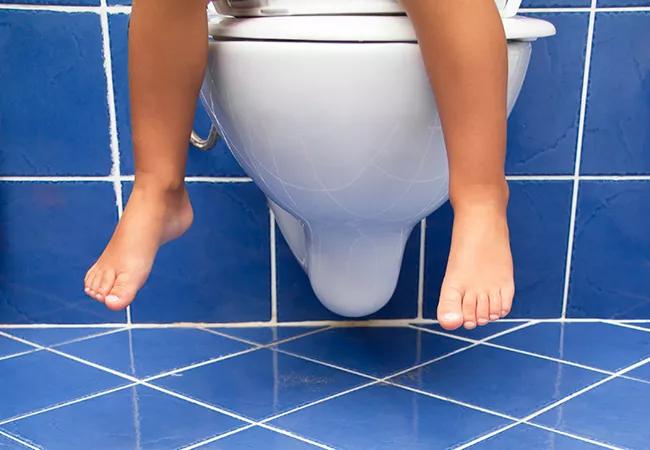Pediatricians should assess readiness and skills of both parent and child

Children with autism spectrum disorder (ASD) are far more likely to have toileting issues than the general pediatric population, according to behavioral psychologist Cynthia Johnson, PhD, Director of the Center for Autism at Children’s Hospital for Rehabilitation. Although some children with ASD may be ready for toilet training at the same time as their peers, readiness delays are common. And because it can be difficult for parents to achieve successful and long-lasting results, assistance from autism specialists such as herself may be beneficial.
Advertisement
Cleveland Clinic is a non-profit academic medical center. Advertising on our site helps support our mission. We do not endorse non-Cleveland Clinic products or services. Policy
“It’s fair to say that over 50% of children with ASD, may present with toileting issues compared to just 5-10% of children without ASD,” Dr. Johnson reports. Issues can range from children not being trained at all by school age, to being trained to use the toilet during the day but still having nocturnal enuresis, to being trained to control bladder function but not bowel function. These issues can persist throughout childhood and across the range of ASD, and can result in a number of negative consequences for both children and their families, including:
Toilet training difficulties are common among children with ASD likely due to overlapping other features such as communication deficits and sensory sensitivities. A child may not able to effectively communicate their need to use the toilet. These children may also have an aversion to the sound of the toilet flushing and may experience anxiety associated with toileting. Moreover, selective food choices may lead to constipation and gastrointestinal discomfort, which may in turn throw off their elimination schedules. Children with ASD also may not be as socially motivated to control their bladder and bowel function as non-ASD children or to imitate older siblings and others in the family who use the toilet.
In addition, says Dr. Johnson, one-third of children with ASD have co-occurring intellectual disabilities that slow their rate of learning; these children require repetition to gain new habits such as toileting. They also may have established atypical elimination patterns that are not associated with using the toilet but rather with the presence of a diaper or pull-up. These habits may be difficult to replace with appropriate toileting habits.
Advertisement
Parent readiness is as essential to the successful toilet training of children with ASD as child readiness. Dr. Johnson advises pediatricians to query parents about their interest in taking on toilet training, in addition to assessing whether children are showing signs of being ready to toilet.
“It can be a very intensive, stressful and time-consuming process for parents, taking many weeks to months, and they may have other goals for their children that take precedence,” she says. In addition, unsuccessful attempts at toilet training may create aversions in a child and make it more difficult to establish desired toileting habits in the future.
As with children without ASD, clinical assessment of a child’s readiness and skills to begin toilet training focuses on their basic communication and imitation skills, as well as their ability to hold urine overnight and to remove and pull up their pants. Parents should be alert to signs of distress when eliminating, such as constipation or pain on urination, and report these events to pediatricians.
Children and parents should be referred to an autism specialist (e.g., a psychologist or behavioral analyst) for a consultation if pediatricians have exhausted their standard advice about toileting and parents have attempted to follow these strategies, but their children still are not successfully using the toilet on a regular basis.
“Of course, pediatricians should check and treat children for medical contributors, such as genital deformities, urinary tract infections or neurological or endocrine disorders, before referring. But if children aren’t progressing, parents can often benefit from parental coaching,” Dr. Johnson says.
Advertisement
Sessions with autism specialists focus on child-specific barriers to toilet training, identification of precursor behavioral signs that a child is ready to eliminate, use of adaptive supports (e.g., modified toilet seats, handrails and footstools and picture-based visual supports) and reinforcement strategies. Parents should also be instructed to keep data on successful and unsuccessful voids and bowel movements so their children’s progress can be monitored and strategies modified to their needs.
Dr. Johnson, who has conducted research showing that parent training offers significant benefits over psychoeducation in managing disruptive behavior in children with ASD, concludes that “offering support and teaching behavioral skills to parents of children with ASD can help to reduce their stress and improve their feelings of competence, leading to more successful outcomes for toilet training.”
Advertisement
Advertisement

Findings hold lessons for future pandemics

One pediatric urologist’s quest to improve the status quo

Overcoming barriers to implementing clinical trials

Interim results of RUBY study also indicate improved physical function and quality of life

Innovative hardware and AI algorithms aim to detect cardiovascular decline sooner

The benefits of this emerging surgical technology

Integrated care model reduces length of stay, improves outpatient pain management

A closer look at the impact on procedures and patient outcomes